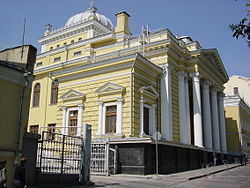- Moscow Choral Synagogue
-
Moscow Choral Synagogue
Mocковская хopaльнaя синaгoга
Basic information Location  Moscow, Russia
Moscow, RussiaAffiliation Orthodox Judaism Architectural description Architect(s) Semeon Eibuschitz (design)
Roman Klein (completion)Architectural style Eclecticism Completed 1906 Specifications The Moscow Choral Synagogue (Russian: Московская Хopaльнaя Cинaгoга) is the main synagogue in Russia and in the former Soviet Union. It is located in central Basmanny District at 10, Bolshoy Spasogolinischevsky Lane, close to Kitai-Gorod Metro station. Rabbi Pinchas Goldschmidt is the spiritual head of this Synagogue.
Contents
History
The synagogue is located close to the former Jewish settlement in Zaryadye. Moscow city authorities had officially banned synagogue construction inside Kitai-gorod, thus the synagogue was built one block east from its walls. In 1881, the community hired architect Semeon Eibuschitz, an Austrian citizen working in Moscow. However, his 1881 draft plan was not approved by authorities. The second draft, also by Eibuschitz, was approved in July, 1886, and construction began on May 28, 1887. In 1888, the city intervened again, and required the builders to remove the completed dome and the exterior image of the Scrolls of Moses. Construction dragged on for five years, until the authorities once again banned it in 1892, giving two choices - sell the unfinished building or convert it into a charity.
During the Russian Revolution of 1905, the Czarist government was forced to lift all bans on worship, so Jews, Old Believers, and other minority faith groups were free to build their places of worship anywhere. Eibuschitz had died in 1898, and so the community hired famous architect Roman Klein to finish the construction. The synagogue opened in 1906. It operated throughout the Soviet period, although authorities had annexed some parts of the original building for secular purposes (in 1923 and 1960).
In September, 1948, Golda Meir, the first ambassador from Israel to the Soviet Union, paid an unauthorized visit to the synagogue, enraging the Soviet government.[1]
The synagogue has been recently restored. It is also known for the famous choir of Michael Turetsky.
Rabbis
The chief Moscow rabbi up to 1938 Shmarya Yehuda Leib Medalia, born in Lithuania in 1872, started his rabbinical service in Tula, then a small provincial town about 100 miles from Moscow, and later moved to serve a much larger and more vibrant Jewish community in the Belorussian city of Vitebsk. By the time of revolution of 1917, the Rabbi had six sons and five daughters. In the 1920s, he was invited to take over the Moscow Choral Synagogue, and the family moved to the Soviet capital. He had become a follower of the Chasidic Lubavicher Rebbe Schneerson who was luckily exiled by the Soviets out of the country and at the time lived in Poland. To be an active religious leader, especially a Jewish one, under the Communists was an uneasy task, and the Moscow Rabbi was permanently harassed by the authorities, chased from a Moscow apartment and settled out of the city limits. Captain of the State Security Aronov wrote, in his report of Dec. 28, 1937, that Rabbi Medalie maintained “illegal” relations with Rabbi Schneerson. Captain Aronov requested a prosecutor’s sanction for the search and arrest. The Rabbi was arrested on January 4, 1938. The close short session of the Military Board of the Supreme Court of the USSR met on April 26, 1938, without calling prosecutors, defencse attorneys and witnesses, and sentenced the rabbi to execution by immediate firing. The rabbi was shot on the same day. On December 7, 1957, the sentence was vacated "due to the absence of a crime." Source: E.M. Rabinovich, "Sentence - Execution", Moment, Febr. 1999.
See also
- Grand Choral Synagogue of St. Petersburg
Notes
- ^ [1].
- ^ a b THEODORE SHABAD (June 4, 1972), "MOSCOW'S JEWS GET A NEW RABBI; Post at Central Synagogue Is Filled After 6 Months", The New York Times, http://select.nytimes.com/gst/abstract.html?res=F60E13F83A5910738DDDAD0894DE405B828BF1D3
- ^ News in Brief - Los Angeles Times - Jun 4, 1972
- ^ a b Anthony Barbieri, Jr. (Jun 9, 1983), "Death Frees Moscow's Rabbi", Spokane Chronicle, http://news.google.com/newspapers?id=5cQSAAAAIBAJ&sjid=cPkDAAAAIBAJ&pg=5174,1956293&dq=adolf+shayevich&hl=en
References
 Media related to Moscow Choral Synagogue at Wikimedia Commons
Media related to Moscow Choral Synagogue at Wikimedia Commons- Улицкий, Е.Н., "История Московской еврейской общины: Документы и материалы (XVIII - начало ХХ в.)", М, КРПА ОЛИМП, 2006
- Лобовская, М.И., "История Московской хоральной синагоги", М, Дом еврейской книги, 2006
External links
- (Russian) History, the Jewish Congress
- (Russian) Official site of the Moscow Choral Synagogue
Categories:- Buildings and structures in Moscow
- Jewish music
- Synagogues in Moscow
Wikimedia Foundation. 2010.

